Legal & Ethical Considerations in Person-Centered Care, NURBN 1001
VerifiedAdded on 2023/03/23
|10
|2922
|25
Essay
AI Summary
This essay provides a comprehensive analysis of legal and ethical decision-making within the context of person-centered care, using a case study of a 14-year-old girl, Taylah, seeking contraception at a sexual health clinic. The paper delves into the application of Beauchamp and Childress's four ethical principles: autonomy, beneficence, non-maleficence, and justice. The analysis explores how the sexual health nurse's actions align with or violate these principles, considering Taylah's age, diabetes, self-esteem issues, and risky behaviors. The essay highlights instances where the nurse respects Taylah's autonomy, but also identifies failures in upholding beneficence and non-maleficence by not addressing her underlying health concerns and potential harms to her and society. The principle of justice is also examined, with critique of the nurse's approach in handling Taylah's case. The essay argues that the nurse's decisions, such as providing contraception without addressing other health issues, may lead to negative consequences for the patient, her family, and society. The essay concludes with a critical evaluation of the ethical considerations involved in providing care to underage patients in sensitive situations.
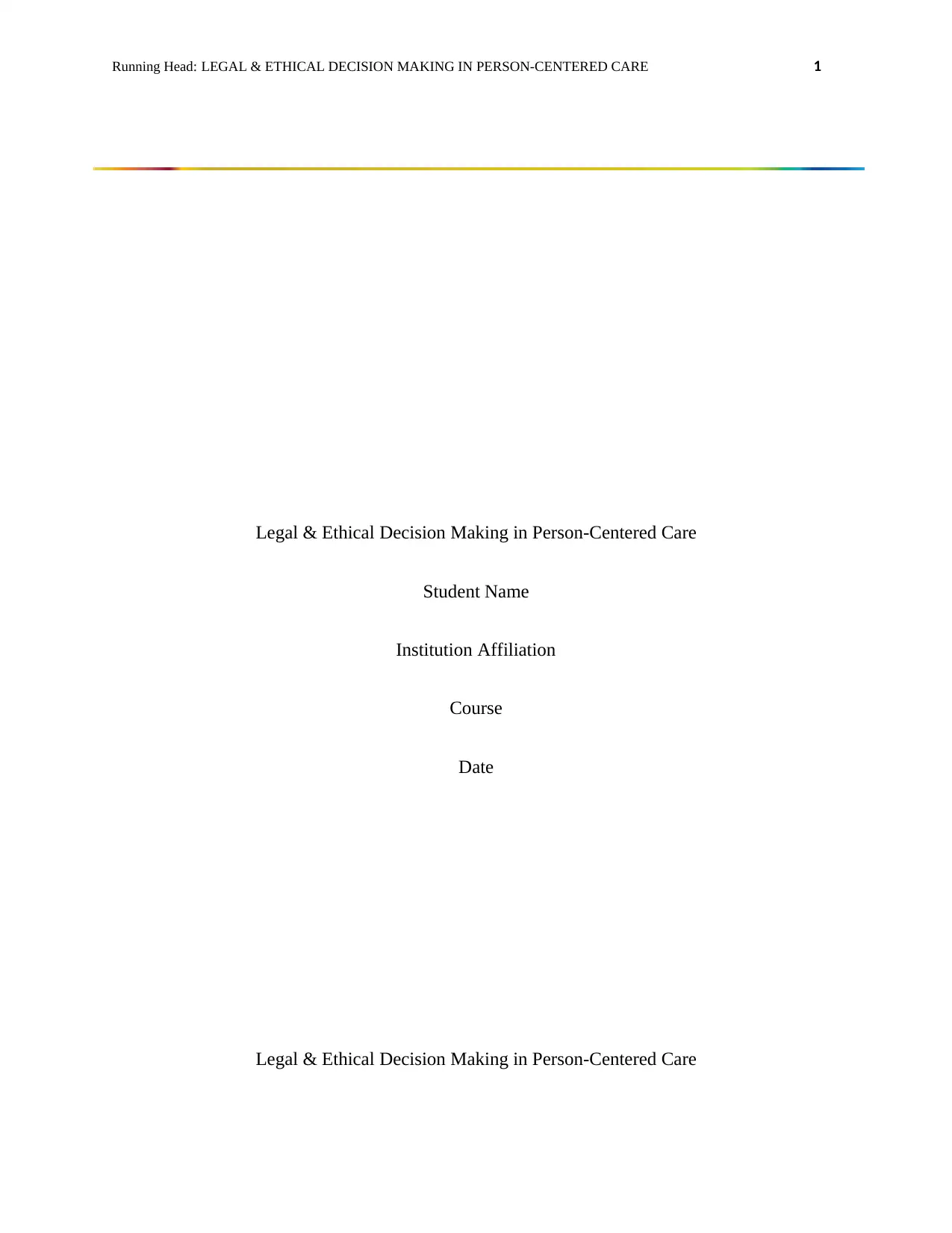
Running Head: LEGAL & ETHICAL DECISION MAKING IN PERSON-CENTERED CARE 1
Legal & Ethical Decision Making in Person-Centered Care
Student Name
Institution Affiliation
Course
Date
Legal & Ethical Decision Making in Person-Centered Care
Legal & Ethical Decision Making in Person-Centered Care
Student Name
Institution Affiliation
Course
Date
Legal & Ethical Decision Making in Person-Centered Care
Paraphrase This Document
Need a fresh take? Get an instant paraphrase of this document with our AI Paraphraser
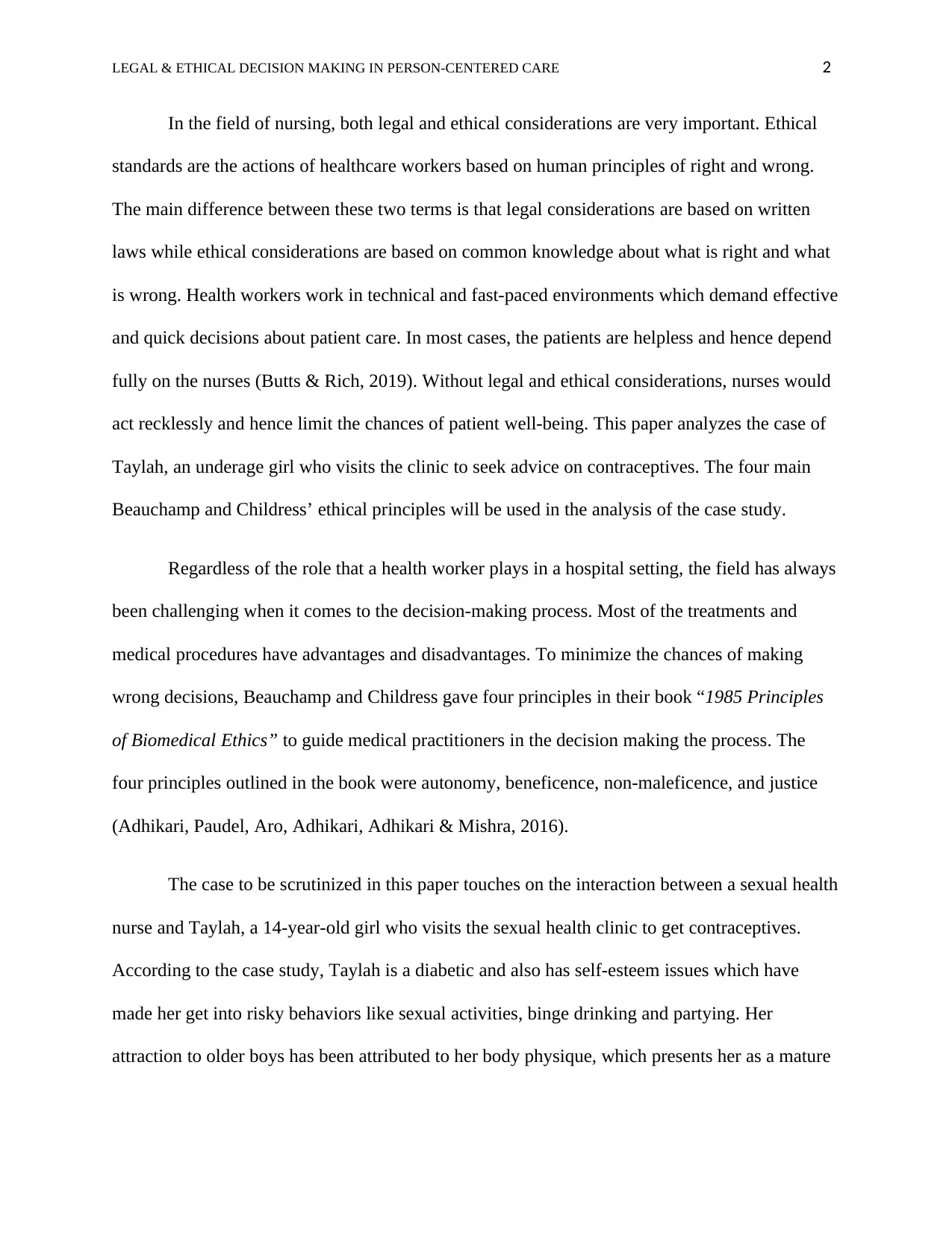
LEGAL & ETHICAL DECISION MAKING IN PERSON-CENTERED CARE 2
In the field of nursing, both legal and ethical considerations are very important. Ethical
standards are the actions of healthcare workers based on human principles of right and wrong.
The main difference between these two terms is that legal considerations are based on written
laws while ethical considerations are based on common knowledge about what is right and what
is wrong. Health workers work in technical and fast-paced environments which demand effective
and quick decisions about patient care. In most cases, the patients are helpless and hence depend
fully on the nurses (Butts & Rich, 2019). Without legal and ethical considerations, nurses would
act recklessly and hence limit the chances of patient well-being. This paper analyzes the case of
Taylah, an underage girl who visits the clinic to seek advice on contraceptives. The four main
Beauchamp and Childress’ ethical principles will be used in the analysis of the case study.
Regardless of the role that a health worker plays in a hospital setting, the field has always
been challenging when it comes to the decision-making process. Most of the treatments and
medical procedures have advantages and disadvantages. To minimize the chances of making
wrong decisions, Beauchamp and Childress gave four principles in their book “1985 Principles
of Biomedical Ethics” to guide medical practitioners in the decision making the process. The
four principles outlined in the book were autonomy, beneficence, non-maleficence, and justice
(Adhikari, Paudel, Aro, Adhikari, Adhikari & Mishra, 2016).
The case to be scrutinized in this paper touches on the interaction between a sexual health
nurse and Taylah, a 14-year-old girl who visits the sexual health clinic to get contraceptives.
According to the case study, Taylah is a diabetic and also has self-esteem issues which have
made her get into risky behaviors like sexual activities, binge drinking and partying. Her
attraction to older boys has been attributed to her body physique, which presents her as a mature
In the field of nursing, both legal and ethical considerations are very important. Ethical
standards are the actions of healthcare workers based on human principles of right and wrong.
The main difference between these two terms is that legal considerations are based on written
laws while ethical considerations are based on common knowledge about what is right and what
is wrong. Health workers work in technical and fast-paced environments which demand effective
and quick decisions about patient care. In most cases, the patients are helpless and hence depend
fully on the nurses (Butts & Rich, 2019). Without legal and ethical considerations, nurses would
act recklessly and hence limit the chances of patient well-being. This paper analyzes the case of
Taylah, an underage girl who visits the clinic to seek advice on contraceptives. The four main
Beauchamp and Childress’ ethical principles will be used in the analysis of the case study.
Regardless of the role that a health worker plays in a hospital setting, the field has always
been challenging when it comes to the decision-making process. Most of the treatments and
medical procedures have advantages and disadvantages. To minimize the chances of making
wrong decisions, Beauchamp and Childress gave four principles in their book “1985 Principles
of Biomedical Ethics” to guide medical practitioners in the decision making the process. The
four principles outlined in the book were autonomy, beneficence, non-maleficence, and justice
(Adhikari, Paudel, Aro, Adhikari, Adhikari & Mishra, 2016).
The case to be scrutinized in this paper touches on the interaction between a sexual health
nurse and Taylah, a 14-year-old girl who visits the sexual health clinic to get contraceptives.
According to the case study, Taylah is a diabetic and also has self-esteem issues which have
made her get into risky behaviors like sexual activities, binge drinking and partying. Her
attraction to older boys has been attributed to her body physique, which presents her as a mature
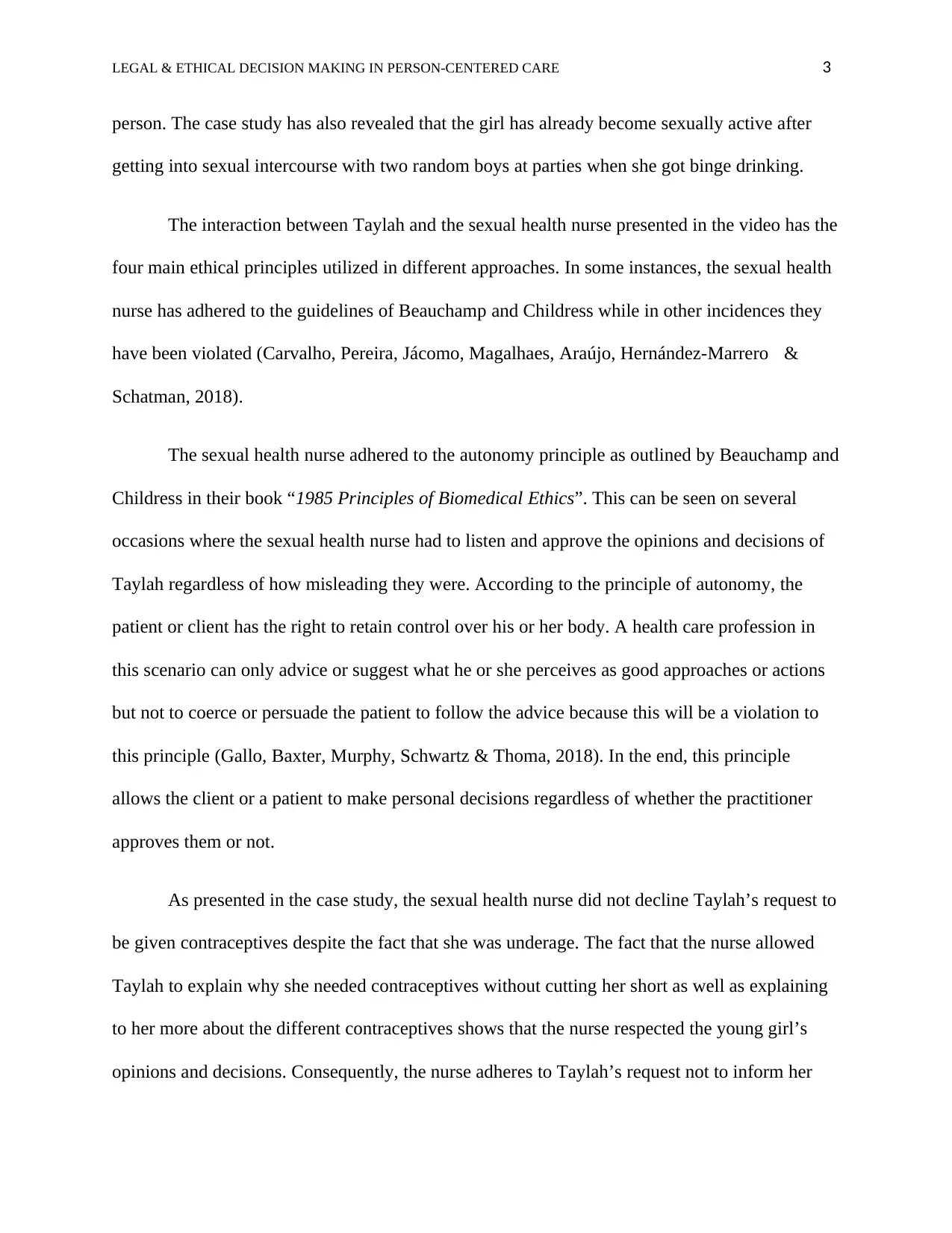
LEGAL & ETHICAL DECISION MAKING IN PERSON-CENTERED CARE 3
person. The case study has also revealed that the girl has already become sexually active after
getting into sexual intercourse with two random boys at parties when she got binge drinking.
The interaction between Taylah and the sexual health nurse presented in the video has the
four main ethical principles utilized in different approaches. In some instances, the sexual health
nurse has adhered to the guidelines of Beauchamp and Childress while in other incidences they
have been violated (Carvalho, Pereira, Jácomo, Magalhaes, Araújo, Hernández-Marrero &
Schatman, 2018).
The sexual health nurse adhered to the autonomy principle as outlined by Beauchamp and
Childress in their book “1985 Principles of Biomedical Ethics”. This can be seen on several
occasions where the sexual health nurse had to listen and approve the opinions and decisions of
Taylah regardless of how misleading they were. According to the principle of autonomy, the
patient or client has the right to retain control over his or her body. A health care profession in
this scenario can only advice or suggest what he or she perceives as good approaches or actions
but not to coerce or persuade the patient to follow the advice because this will be a violation to
this principle (Gallo, Baxter, Murphy, Schwartz & Thoma, 2018). In the end, this principle
allows the client or a patient to make personal decisions regardless of whether the practitioner
approves them or not.
As presented in the case study, the sexual health nurse did not decline Taylah’s request to
be given contraceptives despite the fact that she was underage. The fact that the nurse allowed
Taylah to explain why she needed contraceptives without cutting her short as well as explaining
to her more about the different contraceptives shows that the nurse respected the young girl’s
opinions and decisions. Consequently, the nurse adheres to Taylah’s request not to inform her
person. The case study has also revealed that the girl has already become sexually active after
getting into sexual intercourse with two random boys at parties when she got binge drinking.
The interaction between Taylah and the sexual health nurse presented in the video has the
four main ethical principles utilized in different approaches. In some instances, the sexual health
nurse has adhered to the guidelines of Beauchamp and Childress while in other incidences they
have been violated (Carvalho, Pereira, Jácomo, Magalhaes, Araújo, Hernández-Marrero &
Schatman, 2018).
The sexual health nurse adhered to the autonomy principle as outlined by Beauchamp and
Childress in their book “1985 Principles of Biomedical Ethics”. This can be seen on several
occasions where the sexual health nurse had to listen and approve the opinions and decisions of
Taylah regardless of how misleading they were. According to the principle of autonomy, the
patient or client has the right to retain control over his or her body. A health care profession in
this scenario can only advice or suggest what he or she perceives as good approaches or actions
but not to coerce or persuade the patient to follow the advice because this will be a violation to
this principle (Gallo, Baxter, Murphy, Schwartz & Thoma, 2018). In the end, this principle
allows the client or a patient to make personal decisions regardless of whether the practitioner
approves them or not.
As presented in the case study, the sexual health nurse did not decline Taylah’s request to
be given contraceptives despite the fact that she was underage. The fact that the nurse allowed
Taylah to explain why she needed contraceptives without cutting her short as well as explaining
to her more about the different contraceptives shows that the nurse respected the young girl’s
opinions and decisions. Consequently, the nurse adheres to Taylah’s request not to inform her
⊘ This is a preview!⊘
Do you want full access?
Subscribe today to unlock all pages.

Trusted by 1+ million students worldwide
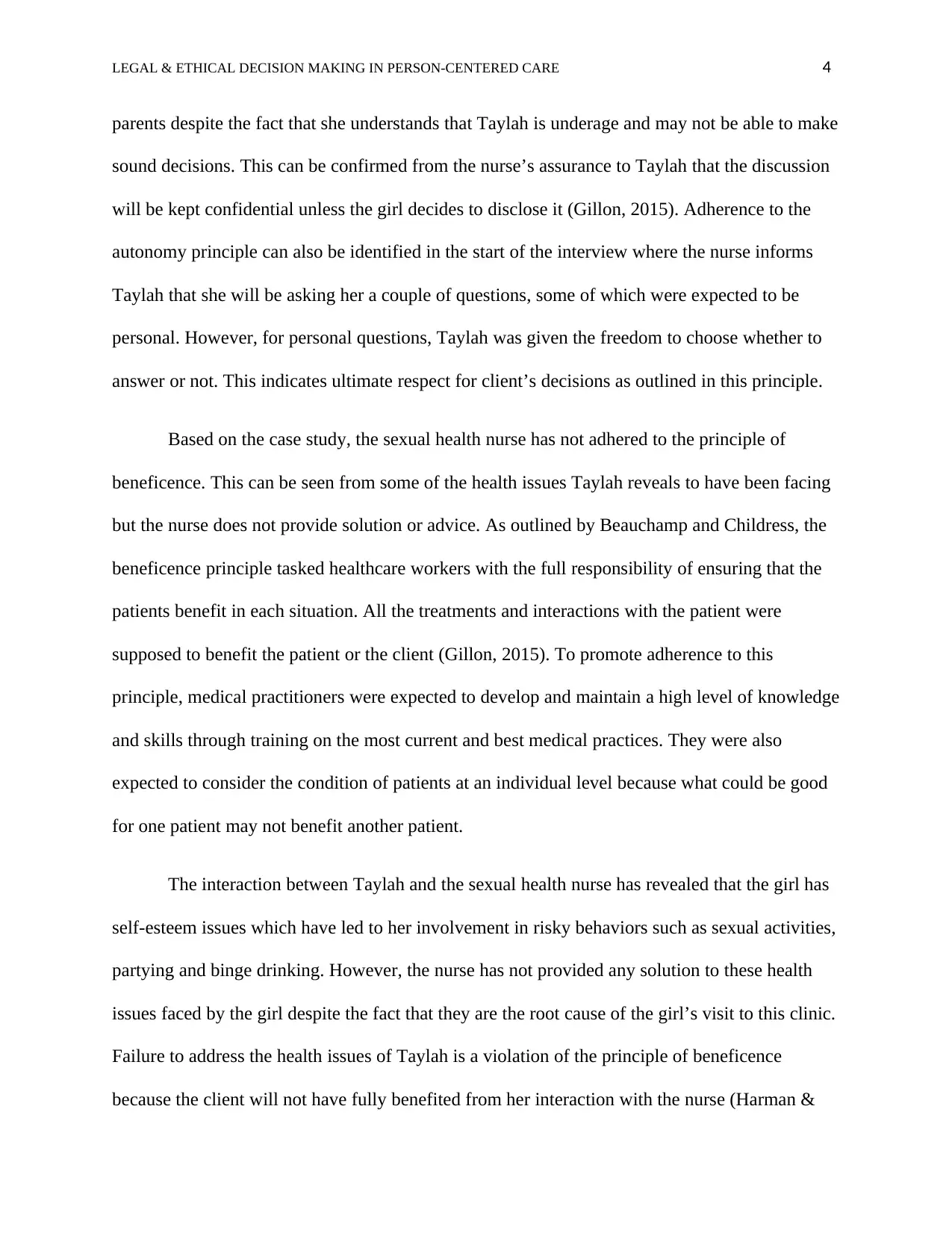
LEGAL & ETHICAL DECISION MAKING IN PERSON-CENTERED CARE 4
parents despite the fact that she understands that Taylah is underage and may not be able to make
sound decisions. This can be confirmed from the nurse’s assurance to Taylah that the discussion
will be kept confidential unless the girl decides to disclose it (Gillon, 2015). Adherence to the
autonomy principle can also be identified in the start of the interview where the nurse informs
Taylah that she will be asking her a couple of questions, some of which were expected to be
personal. However, for personal questions, Taylah was given the freedom to choose whether to
answer or not. This indicates ultimate respect for client’s decisions as outlined in this principle.
Based on the case study, the sexual health nurse has not adhered to the principle of
beneficence. This can be seen from some of the health issues Taylah reveals to have been facing
but the nurse does not provide solution or advice. As outlined by Beauchamp and Childress, the
beneficence principle tasked healthcare workers with the full responsibility of ensuring that the
patients benefit in each situation. All the treatments and interactions with the patient were
supposed to benefit the patient or the client (Gillon, 2015). To promote adherence to this
principle, medical practitioners were expected to develop and maintain a high level of knowledge
and skills through training on the most current and best medical practices. They were also
expected to consider the condition of patients at an individual level because what could be good
for one patient may not benefit another patient.
The interaction between Taylah and the sexual health nurse has revealed that the girl has
self-esteem issues which have led to her involvement in risky behaviors such as sexual activities,
partying and binge drinking. However, the nurse has not provided any solution to these health
issues faced by the girl despite the fact that they are the root cause of the girl’s visit to this clinic.
Failure to address the health issues of Taylah is a violation of the principle of beneficence
because the client will not have fully benefited from her interaction with the nurse (Harman &
parents despite the fact that she understands that Taylah is underage and may not be able to make
sound decisions. This can be confirmed from the nurse’s assurance to Taylah that the discussion
will be kept confidential unless the girl decides to disclose it (Gillon, 2015). Adherence to the
autonomy principle can also be identified in the start of the interview where the nurse informs
Taylah that she will be asking her a couple of questions, some of which were expected to be
personal. However, for personal questions, Taylah was given the freedom to choose whether to
answer or not. This indicates ultimate respect for client’s decisions as outlined in this principle.
Based on the case study, the sexual health nurse has not adhered to the principle of
beneficence. This can be seen from some of the health issues Taylah reveals to have been facing
but the nurse does not provide solution or advice. As outlined by Beauchamp and Childress, the
beneficence principle tasked healthcare workers with the full responsibility of ensuring that the
patients benefit in each situation. All the treatments and interactions with the patient were
supposed to benefit the patient or the client (Gillon, 2015). To promote adherence to this
principle, medical practitioners were expected to develop and maintain a high level of knowledge
and skills through training on the most current and best medical practices. They were also
expected to consider the condition of patients at an individual level because what could be good
for one patient may not benefit another patient.
The interaction between Taylah and the sexual health nurse has revealed that the girl has
self-esteem issues which have led to her involvement in risky behaviors such as sexual activities,
partying and binge drinking. However, the nurse has not provided any solution to these health
issues faced by the girl despite the fact that they are the root cause of the girl’s visit to this clinic.
Failure to address the health issues of Taylah is a violation of the principle of beneficence
because the client will not have fully benefited from her interaction with the nurse (Harman &
Paraphrase This Document
Need a fresh take? Get an instant paraphrase of this document with our AI Paraphraser
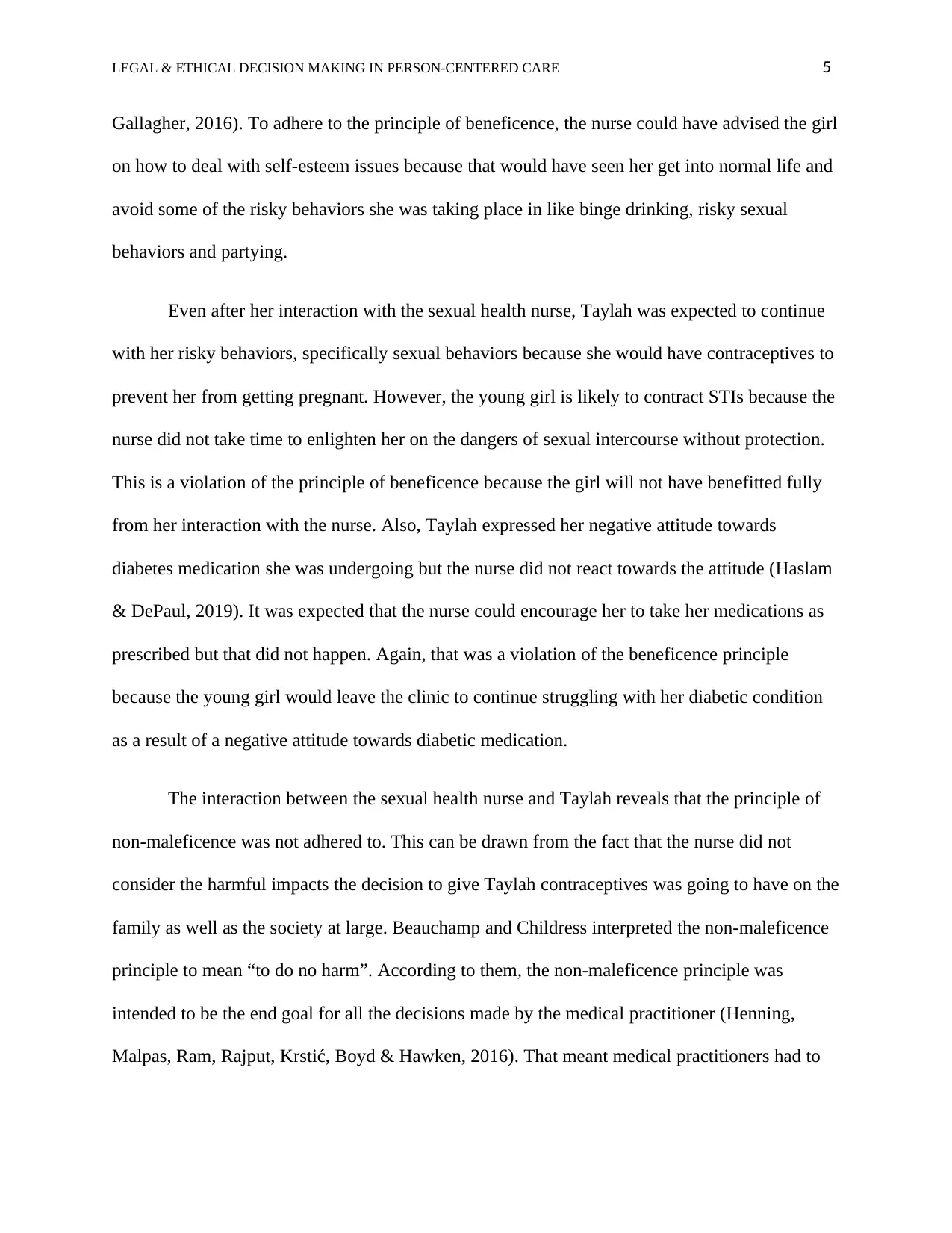
LEGAL & ETHICAL DECISION MAKING IN PERSON-CENTERED CARE 5
Gallagher, 2016). To adhere to the principle of beneficence, the nurse could have advised the girl
on how to deal with self-esteem issues because that would have seen her get into normal life and
avoid some of the risky behaviors she was taking place in like binge drinking, risky sexual
behaviors and partying.
Even after her interaction with the sexual health nurse, Taylah was expected to continue
with her risky behaviors, specifically sexual behaviors because she would have contraceptives to
prevent her from getting pregnant. However, the young girl is likely to contract STIs because the
nurse did not take time to enlighten her on the dangers of sexual intercourse without protection.
This is a violation of the principle of beneficence because the girl will not have benefitted fully
from her interaction with the nurse. Also, Taylah expressed her negative attitude towards
diabetes medication she was undergoing but the nurse did not react towards the attitude (Haslam
& DePaul, 2019). It was expected that the nurse could encourage her to take her medications as
prescribed but that did not happen. Again, that was a violation of the beneficence principle
because the young girl would leave the clinic to continue struggling with her diabetic condition
as a result of a negative attitude towards diabetic medication.
The interaction between the sexual health nurse and Taylah reveals that the principle of
non-maleficence was not adhered to. This can be drawn from the fact that the nurse did not
consider the harmful impacts the decision to give Taylah contraceptives was going to have on the
family as well as the society at large. Beauchamp and Childress interpreted the non-maleficence
principle to mean “to do no harm”. According to them, the non-maleficence principle was
intended to be the end goal for all the decisions made by the medical practitioner (Henning,
Malpas, Ram, Rajput, Krstić, Boyd & Hawken, 2016). That meant medical practitioners had to
Gallagher, 2016). To adhere to the principle of beneficence, the nurse could have advised the girl
on how to deal with self-esteem issues because that would have seen her get into normal life and
avoid some of the risky behaviors she was taking place in like binge drinking, risky sexual
behaviors and partying.
Even after her interaction with the sexual health nurse, Taylah was expected to continue
with her risky behaviors, specifically sexual behaviors because she would have contraceptives to
prevent her from getting pregnant. However, the young girl is likely to contract STIs because the
nurse did not take time to enlighten her on the dangers of sexual intercourse without protection.
This is a violation of the principle of beneficence because the girl will not have benefitted fully
from her interaction with the nurse. Also, Taylah expressed her negative attitude towards
diabetes medication she was undergoing but the nurse did not react towards the attitude (Haslam
& DePaul, 2019). It was expected that the nurse could encourage her to take her medications as
prescribed but that did not happen. Again, that was a violation of the beneficence principle
because the young girl would leave the clinic to continue struggling with her diabetic condition
as a result of a negative attitude towards diabetic medication.
The interaction between the sexual health nurse and Taylah reveals that the principle of
non-maleficence was not adhered to. This can be drawn from the fact that the nurse did not
consider the harmful impacts the decision to give Taylah contraceptives was going to have on the
family as well as the society at large. Beauchamp and Childress interpreted the non-maleficence
principle to mean “to do no harm”. According to them, the non-maleficence principle was
intended to be the end goal for all the decisions made by the medical practitioner (Henning,
Malpas, Ram, Rajput, Krstić, Boyd & Hawken, 2016). That meant medical practitioners had to
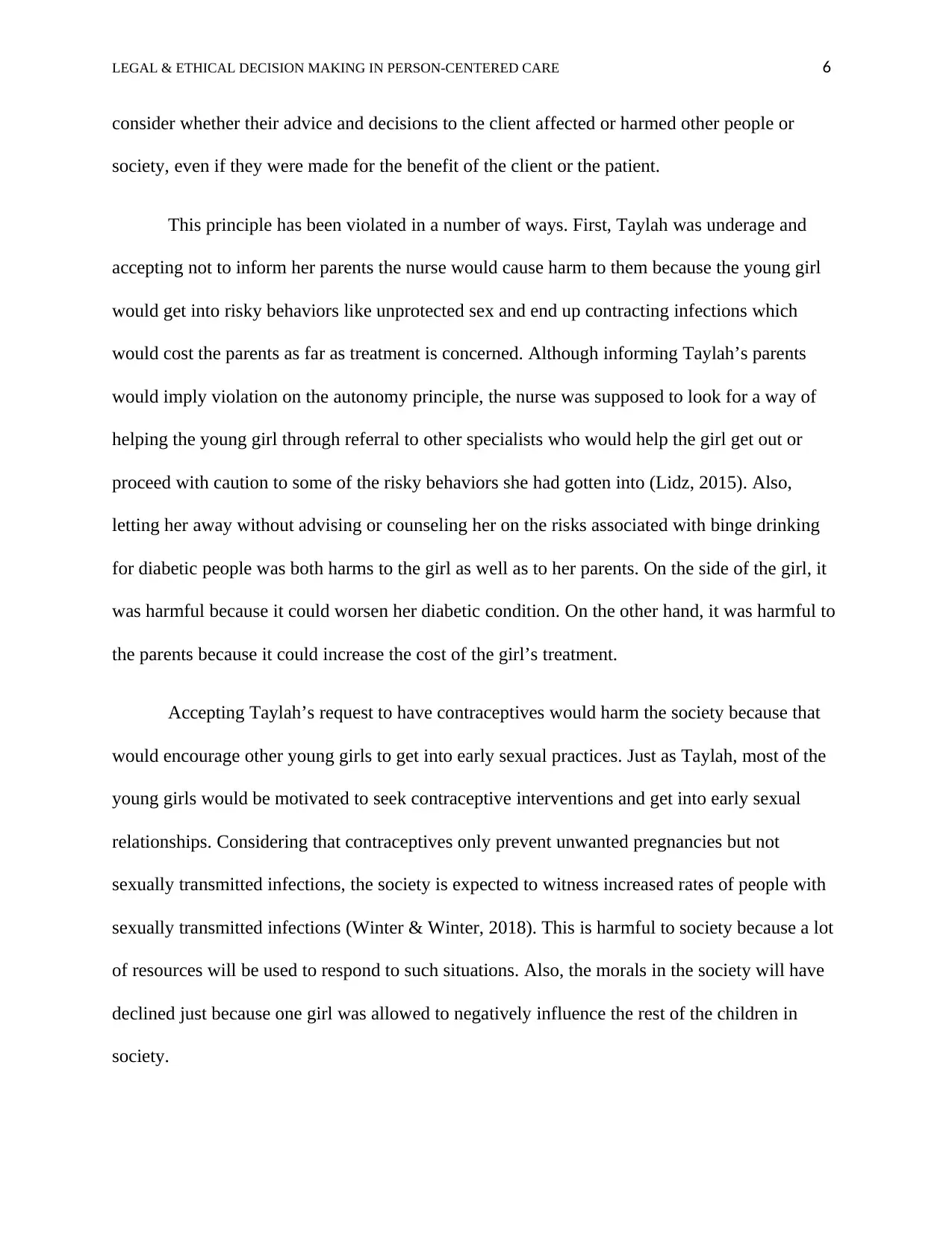
LEGAL & ETHICAL DECISION MAKING IN PERSON-CENTERED CARE 6
consider whether their advice and decisions to the client affected or harmed other people or
society, even if they were made for the benefit of the client or the patient.
This principle has been violated in a number of ways. First, Taylah was underage and
accepting not to inform her parents the nurse would cause harm to them because the young girl
would get into risky behaviors like unprotected sex and end up contracting infections which
would cost the parents as far as treatment is concerned. Although informing Taylah’s parents
would imply violation on the autonomy principle, the nurse was supposed to look for a way of
helping the young girl through referral to other specialists who would help the girl get out or
proceed with caution to some of the risky behaviors she had gotten into (Lidz, 2015). Also,
letting her away without advising or counseling her on the risks associated with binge drinking
for diabetic people was both harms to the girl as well as to her parents. On the side of the girl, it
was harmful because it could worsen her diabetic condition. On the other hand, it was harmful to
the parents because it could increase the cost of the girl’s treatment.
Accepting Taylah’s request to have contraceptives would harm the society because that
would encourage other young girls to get into early sexual practices. Just as Taylah, most of the
young girls would be motivated to seek contraceptive interventions and get into early sexual
relationships. Considering that contraceptives only prevent unwanted pregnancies but not
sexually transmitted infections, the society is expected to witness increased rates of people with
sexually transmitted infections (Winter & Winter, 2018). This is harmful to society because a lot
of resources will be used to respond to such situations. Also, the morals in the society will have
declined just because one girl was allowed to negatively influence the rest of the children in
society.
consider whether their advice and decisions to the client affected or harmed other people or
society, even if they were made for the benefit of the client or the patient.
This principle has been violated in a number of ways. First, Taylah was underage and
accepting not to inform her parents the nurse would cause harm to them because the young girl
would get into risky behaviors like unprotected sex and end up contracting infections which
would cost the parents as far as treatment is concerned. Although informing Taylah’s parents
would imply violation on the autonomy principle, the nurse was supposed to look for a way of
helping the young girl through referral to other specialists who would help the girl get out or
proceed with caution to some of the risky behaviors she had gotten into (Lidz, 2015). Also,
letting her away without advising or counseling her on the risks associated with binge drinking
for diabetic people was both harms to the girl as well as to her parents. On the side of the girl, it
was harmful because it could worsen her diabetic condition. On the other hand, it was harmful to
the parents because it could increase the cost of the girl’s treatment.
Accepting Taylah’s request to have contraceptives would harm the society because that
would encourage other young girls to get into early sexual practices. Just as Taylah, most of the
young girls would be motivated to seek contraceptive interventions and get into early sexual
relationships. Considering that contraceptives only prevent unwanted pregnancies but not
sexually transmitted infections, the society is expected to witness increased rates of people with
sexually transmitted infections (Winter & Winter, 2018). This is harmful to society because a lot
of resources will be used to respond to such situations. Also, the morals in the society will have
declined just because one girl was allowed to negatively influence the rest of the children in
society.
⊘ This is a preview!⊘
Do you want full access?
Subscribe today to unlock all pages.

Trusted by 1+ million students worldwide
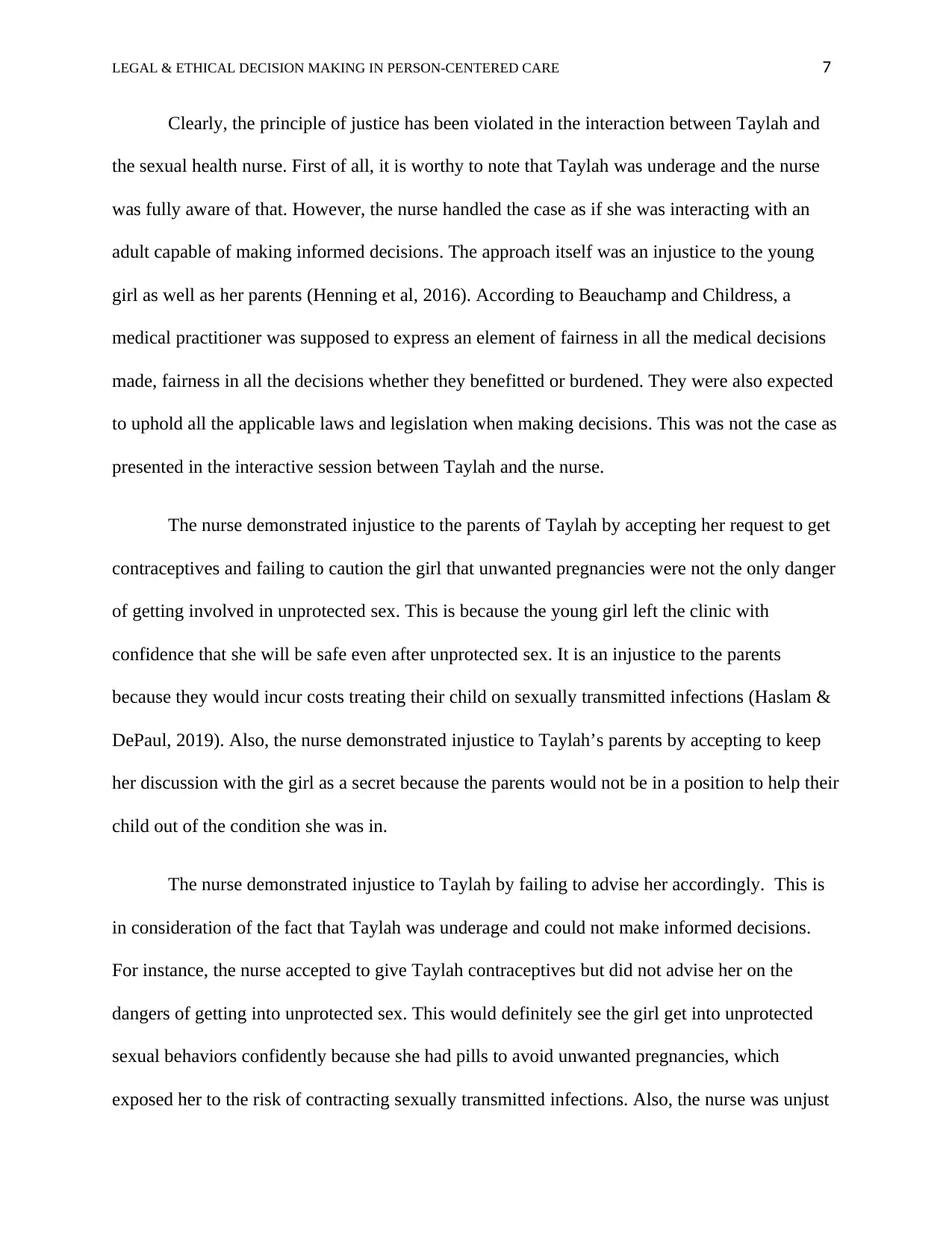
LEGAL & ETHICAL DECISION MAKING IN PERSON-CENTERED CARE 7
Clearly, the principle of justice has been violated in the interaction between Taylah and
the sexual health nurse. First of all, it is worthy to note that Taylah was underage and the nurse
was fully aware of that. However, the nurse handled the case as if she was interacting with an
adult capable of making informed decisions. The approach itself was an injustice to the young
girl as well as her parents (Henning et al, 2016). According to Beauchamp and Childress, a
medical practitioner was supposed to express an element of fairness in all the medical decisions
made, fairness in all the decisions whether they benefitted or burdened. They were also expected
to uphold all the applicable laws and legislation when making decisions. This was not the case as
presented in the interactive session between Taylah and the nurse.
The nurse demonstrated injustice to the parents of Taylah by accepting her request to get
contraceptives and failing to caution the girl that unwanted pregnancies were not the only danger
of getting involved in unprotected sex. This is because the young girl left the clinic with
confidence that she will be safe even after unprotected sex. It is an injustice to the parents
because they would incur costs treating their child on sexually transmitted infections (Haslam &
DePaul, 2019). Also, the nurse demonstrated injustice to Taylah’s parents by accepting to keep
her discussion with the girl as a secret because the parents would not be in a position to help their
child out of the condition she was in.
The nurse demonstrated injustice to Taylah by failing to advise her accordingly. This is
in consideration of the fact that Taylah was underage and could not make informed decisions.
For instance, the nurse accepted to give Taylah contraceptives but did not advise her on the
dangers of getting into unprotected sex. This would definitely see the girl get into unprotected
sexual behaviors confidently because she had pills to avoid unwanted pregnancies, which
exposed her to the risk of contracting sexually transmitted infections. Also, the nurse was unjust
Clearly, the principle of justice has been violated in the interaction between Taylah and
the sexual health nurse. First of all, it is worthy to note that Taylah was underage and the nurse
was fully aware of that. However, the nurse handled the case as if she was interacting with an
adult capable of making informed decisions. The approach itself was an injustice to the young
girl as well as her parents (Henning et al, 2016). According to Beauchamp and Childress, a
medical practitioner was supposed to express an element of fairness in all the medical decisions
made, fairness in all the decisions whether they benefitted or burdened. They were also expected
to uphold all the applicable laws and legislation when making decisions. This was not the case as
presented in the interactive session between Taylah and the nurse.
The nurse demonstrated injustice to the parents of Taylah by accepting her request to get
contraceptives and failing to caution the girl that unwanted pregnancies were not the only danger
of getting involved in unprotected sex. This is because the young girl left the clinic with
confidence that she will be safe even after unprotected sex. It is an injustice to the parents
because they would incur costs treating their child on sexually transmitted infections (Haslam &
DePaul, 2019). Also, the nurse demonstrated injustice to Taylah’s parents by accepting to keep
her discussion with the girl as a secret because the parents would not be in a position to help their
child out of the condition she was in.
The nurse demonstrated injustice to Taylah by failing to advise her accordingly. This is
in consideration of the fact that Taylah was underage and could not make informed decisions.
For instance, the nurse accepted to give Taylah contraceptives but did not advise her on the
dangers of getting into unprotected sex. This would definitely see the girl get into unprotected
sexual behaviors confidently because she had pills to avoid unwanted pregnancies, which
exposed her to the risk of contracting sexually transmitted infections. Also, the nurse was unjust
Paraphrase This Document
Need a fresh take? Get an instant paraphrase of this document with our AI Paraphraser
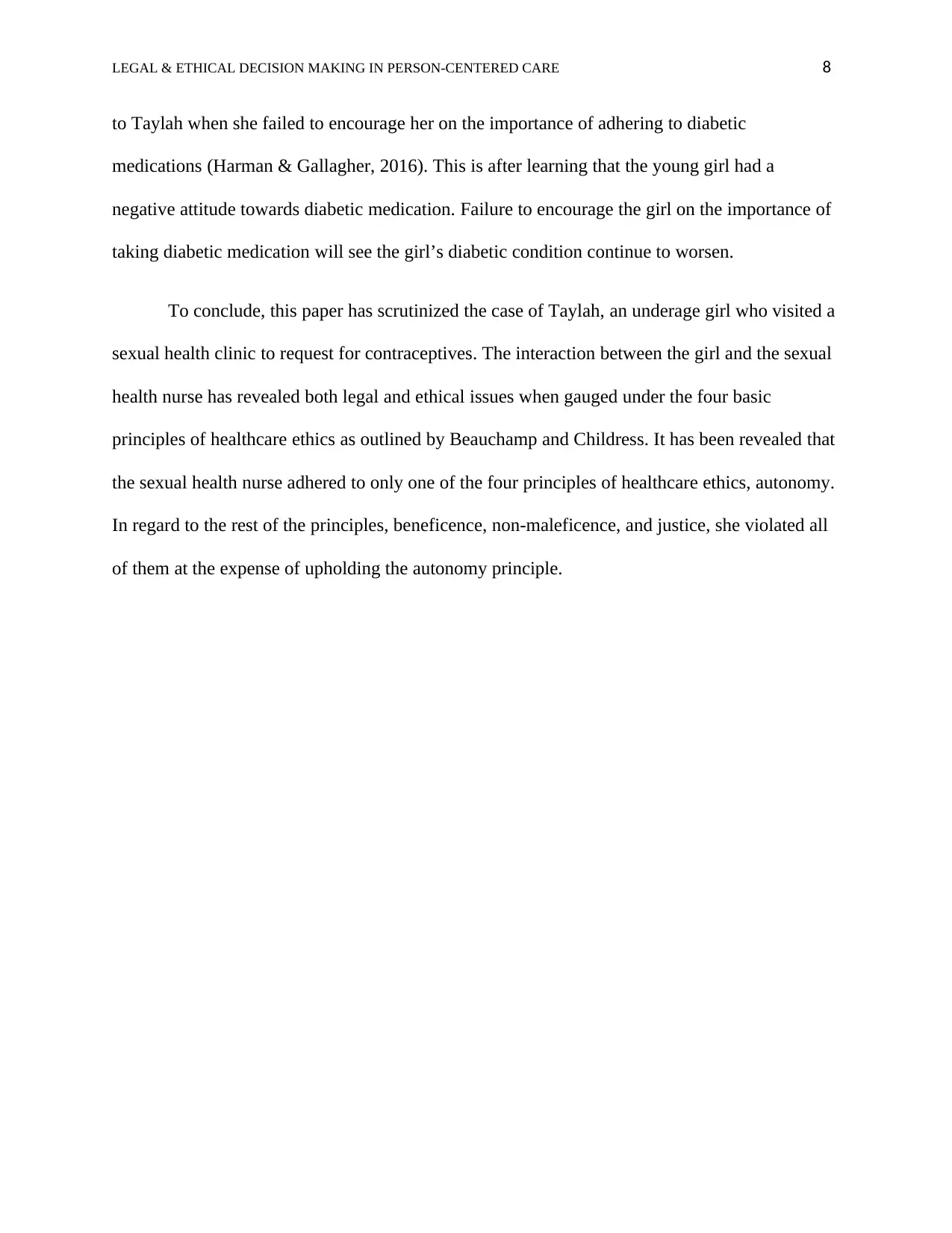
LEGAL & ETHICAL DECISION MAKING IN PERSON-CENTERED CARE 8
to Taylah when she failed to encourage her on the importance of adhering to diabetic
medications (Harman & Gallagher, 2016). This is after learning that the young girl had a
negative attitude towards diabetic medication. Failure to encourage the girl on the importance of
taking diabetic medication will see the girl’s diabetic condition continue to worsen.
To conclude, this paper has scrutinized the case of Taylah, an underage girl who visited a
sexual health clinic to request for contraceptives. The interaction between the girl and the sexual
health nurse has revealed both legal and ethical issues when gauged under the four basic
principles of healthcare ethics as outlined by Beauchamp and Childress. It has been revealed that
the sexual health nurse adhered to only one of the four principles of healthcare ethics, autonomy.
In regard to the rest of the principles, beneficence, non-maleficence, and justice, she violated all
of them at the expense of upholding the autonomy principle.
to Taylah when she failed to encourage her on the importance of adhering to diabetic
medications (Harman & Gallagher, 2016). This is after learning that the young girl had a
negative attitude towards diabetic medication. Failure to encourage the girl on the importance of
taking diabetic medication will see the girl’s diabetic condition continue to worsen.
To conclude, this paper has scrutinized the case of Taylah, an underage girl who visited a
sexual health clinic to request for contraceptives. The interaction between the girl and the sexual
health nurse has revealed both legal and ethical issues when gauged under the four basic
principles of healthcare ethics as outlined by Beauchamp and Childress. It has been revealed that
the sexual health nurse adhered to only one of the four principles of healthcare ethics, autonomy.
In regard to the rest of the principles, beneficence, non-maleficence, and justice, she violated all
of them at the expense of upholding the autonomy principle.
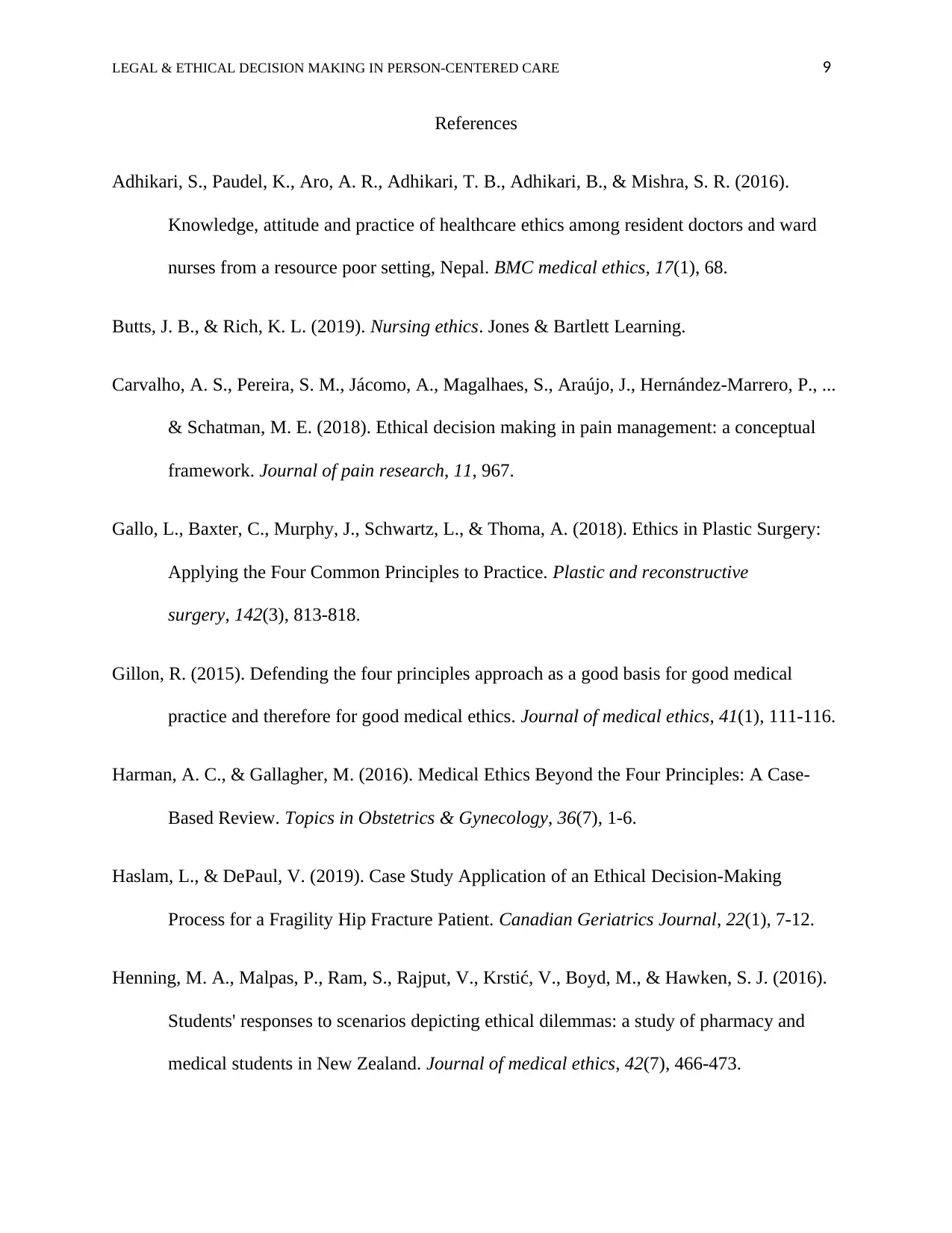
LEGAL & ETHICAL DECISION MAKING IN PERSON-CENTERED CARE 9
References
Adhikari, S., Paudel, K., Aro, A. R., Adhikari, T. B., Adhikari, B., & Mishra, S. R. (2016).
Knowledge, attitude and practice of healthcare ethics among resident doctors and ward
nurses from a resource poor setting, Nepal. BMC medical ethics, 17(1), 68.
Butts, J. B., & Rich, K. L. (2019). Nursing ethics. Jones & Bartlett Learning.
Carvalho, A. S., Pereira, S. M., Jácomo, A., Magalhaes, S., Araújo, J., Hernández-Marrero, P., ...
& Schatman, M. E. (2018). Ethical decision making in pain management: a conceptual
framework. Journal of pain research, 11, 967.
Gallo, L., Baxter, C., Murphy, J., Schwartz, L., & Thoma, A. (2018). Ethics in Plastic Surgery:
Applying the Four Common Principles to Practice. Plastic and reconstructive
surgery, 142(3), 813-818.
Gillon, R. (2015). Defending the four principles approach as a good basis for good medical
practice and therefore for good medical ethics. Journal of medical ethics, 41(1), 111-116.
Harman, A. C., & Gallagher, M. (2016). Medical Ethics Beyond the Four Principles: A Case-
Based Review. Topics in Obstetrics & Gynecology, 36(7), 1-6.
Haslam, L., & DePaul, V. (2019). Case Study Application of an Ethical Decision-Making
Process for a Fragility Hip Fracture Patient. Canadian Geriatrics Journal, 22(1), 7-12.
Henning, M. A., Malpas, P., Ram, S., Rajput, V., Krstić, V., Boyd, M., & Hawken, S. J. (2016).
Students' responses to scenarios depicting ethical dilemmas: a study of pharmacy and
medical students in New Zealand. Journal of medical ethics, 42(7), 466-473.
References
Adhikari, S., Paudel, K., Aro, A. R., Adhikari, T. B., Adhikari, B., & Mishra, S. R. (2016).
Knowledge, attitude and practice of healthcare ethics among resident doctors and ward
nurses from a resource poor setting, Nepal. BMC medical ethics, 17(1), 68.
Butts, J. B., & Rich, K. L. (2019). Nursing ethics. Jones & Bartlett Learning.
Carvalho, A. S., Pereira, S. M., Jácomo, A., Magalhaes, S., Araújo, J., Hernández-Marrero, P., ...
& Schatman, M. E. (2018). Ethical decision making in pain management: a conceptual
framework. Journal of pain research, 11, 967.
Gallo, L., Baxter, C., Murphy, J., Schwartz, L., & Thoma, A. (2018). Ethics in Plastic Surgery:
Applying the Four Common Principles to Practice. Plastic and reconstructive
surgery, 142(3), 813-818.
Gillon, R. (2015). Defending the four principles approach as a good basis for good medical
practice and therefore for good medical ethics. Journal of medical ethics, 41(1), 111-116.
Harman, A. C., & Gallagher, M. (2016). Medical Ethics Beyond the Four Principles: A Case-
Based Review. Topics in Obstetrics & Gynecology, 36(7), 1-6.
Haslam, L., & DePaul, V. (2019). Case Study Application of an Ethical Decision-Making
Process for a Fragility Hip Fracture Patient. Canadian Geriatrics Journal, 22(1), 7-12.
Henning, M. A., Malpas, P., Ram, S., Rajput, V., Krstić, V., Boyd, M., & Hawken, S. J. (2016).
Students' responses to scenarios depicting ethical dilemmas: a study of pharmacy and
medical students in New Zealand. Journal of medical ethics, 42(7), 466-473.
⊘ This is a preview!⊘
Do you want full access?
Subscribe today to unlock all pages.

Trusted by 1+ million students worldwide
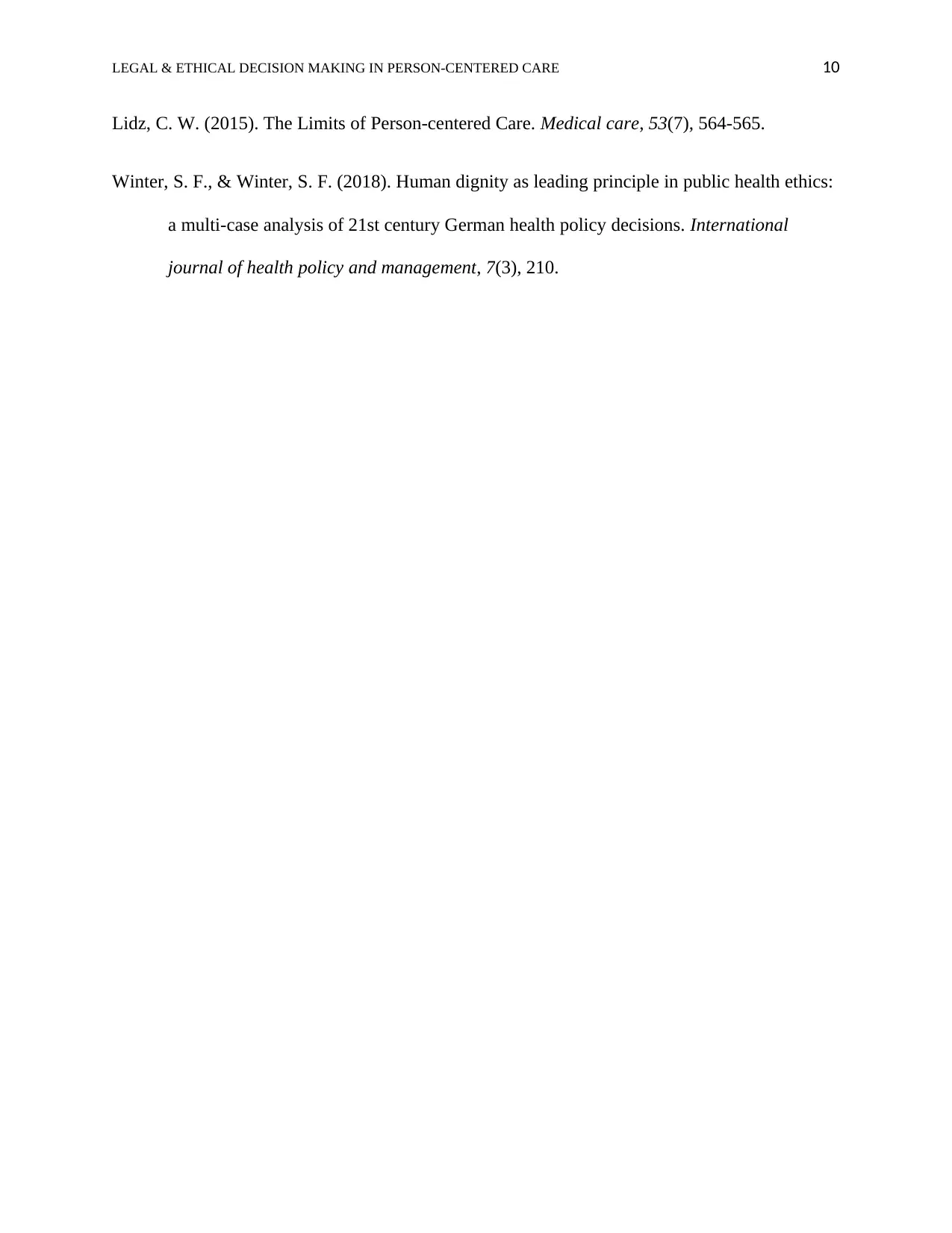
LEGAL & ETHICAL DECISION MAKING IN PERSON-CENTERED CARE 10
Lidz, C. W. (2015). The Limits of Person-centered Care. Medical care, 53(7), 564-565.
Winter, S. F., & Winter, S. F. (2018). Human dignity as leading principle in public health ethics:
a multi-case analysis of 21st century German health policy decisions. International
journal of health policy and management, 7(3), 210.
Lidz, C. W. (2015). The Limits of Person-centered Care. Medical care, 53(7), 564-565.
Winter, S. F., & Winter, S. F. (2018). Human dignity as leading principle in public health ethics:
a multi-case analysis of 21st century German health policy decisions. International
journal of health policy and management, 7(3), 210.
1 out of 10
Related Documents
Your All-in-One AI-Powered Toolkit for Academic Success.
+13062052269
info@desklib.com
Available 24*7 on WhatsApp / Email
![[object Object]](/_next/static/media/star-bottom.7253800d.svg)
Unlock your academic potential
Copyright © 2020–2026 A2Z Services. All Rights Reserved. Developed and managed by ZUCOL.




